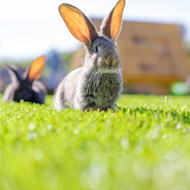RHDV-2 vaccine authorised in the EU

The VMD says vets should use their clinical judgement on a case by case basis to decide the most suitable vaccination protocol.
The European Medicines Agency (EMA) has issued a marketing authorisation for the vaccine ERAVAC, to reduce mortality caused by rabbit haemorrhagic disease virus type 2 (RHDV-2).
Recent analysis by the Animal and Plant Health Agency (APHA) revealed RHDV-2 has been present in Great Britain since 2010 and was found across England, Scotland and Wales. The findings prompted some concern due to the lack of a vaccine.
ERAVAC is produced by Laboratorios Hipra, S.A. and is indicated for the active immunisation of fattening rabbits from the age of 30 days. The marketing authorisation is valid throughout the European Union.
The Veterinary Medicines Directorate (VMD) says it will accept applications to import unauthorised medicines into the UK to treat RHDV-2, if ERAVAC is not available or suitable.
Vaccines against RHDV-2 - such as Filavac VHD K C+V (France) and Novarvipal (Spain) - are authorised in other EU countries. These have previously been imported by UK veterinary surgeons under the Special Import Scheme.
There is no available information on the safety and efficacy of RHDV-2 vaccines for pet rabbits, including when they are used alongside other vaccines (such as classical RHDV or myxomatosis vaccines).
The VMD says vets should use their clinical judgement on a case by case basis to decide the most suitable vaccination protocol. Vets are advised to contact the vaccine manufacturer directly for further information.



 The Veterinary Medicines Directorate (VMD) is inviting applications from veterinary students to attend a one-week extramural studies (EMS) placement in July 2026.
The Veterinary Medicines Directorate (VMD) is inviting applications from veterinary students to attend a one-week extramural studies (EMS) placement in July 2026.